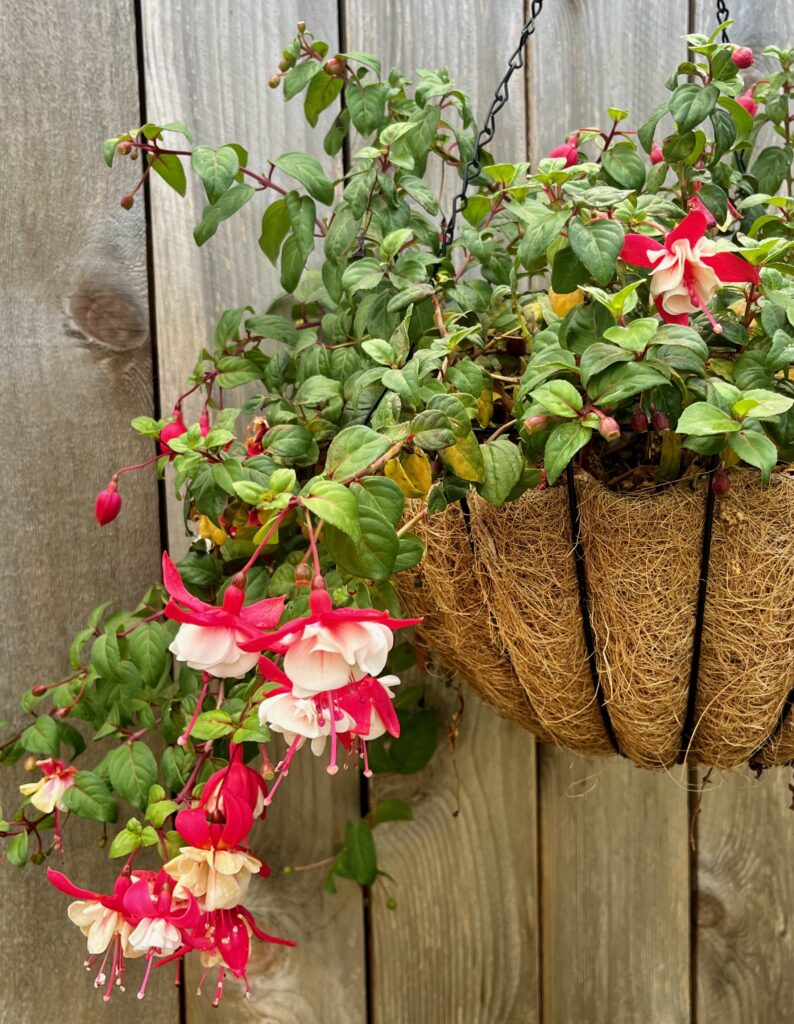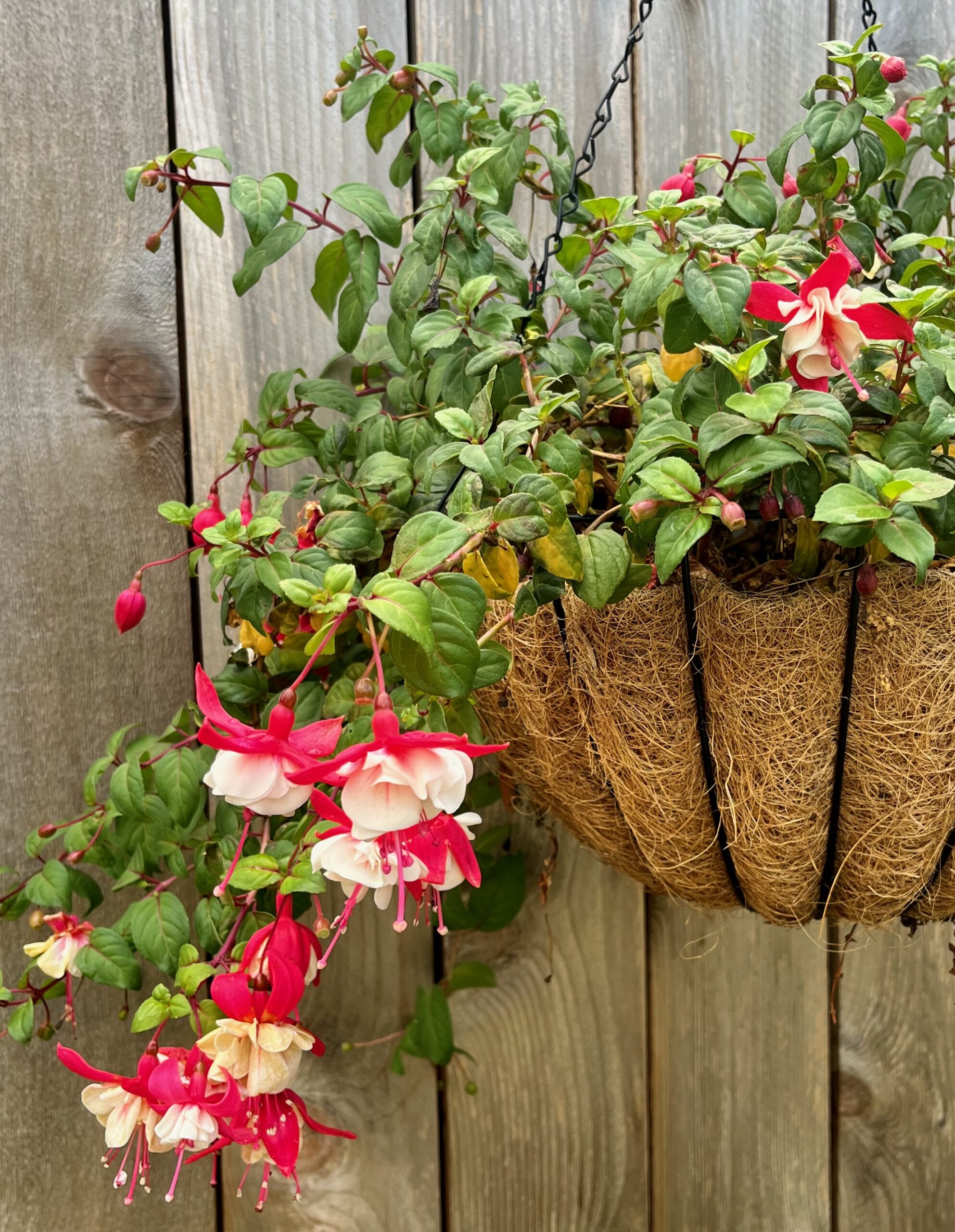


Published in the News-Review November 1, 2024
By: Julie Burchstead
“Overwintering Annual Plants”
Question: I have some annual plants I love in my yard. I invested quite a bit on them this spring, but they are not cold hardy. Is there any way I can keep them alive over the winter and enjoy them again next spring?
Answer: Yes! Many annuals can easily be overwintered. Not only does this practice ensure being able to continue to enjoy the flowers you love, it can also save you money.
It is that time of year. Plant growth is slowing. Many annuals have already completed their cycle and are now seed fodder for birds, providing stem cavities to shelter native bees, cut up for mulch, or added to compost. Leaves are beginning to carpet our yards in swirls and crunches of color. We have experienced our first frost warning. But my hanging basket of fuchsia remains in glorious bloom. And the richly hued coleus I found this past spring still provides that perfect pop of color on my shady patio.
Some winters, I have done nothing, and the geraniums on my exposed porch have made it through on their own. I have had snapdragons survive several winters in the ground. But even here in Douglas County, where most of us enjoy an enviably mild climate, that is playing a game of Russian Roulette. Unless we intervene soon, the days for most annuals are numbered. So what can we do?
There are some simple steps you can take to improve your favorite annuals’ chances of making it through. Before first frost is the time to do it. You can simply mulch in-the-ground plants, or group potted plants in a sheltered place near the house, remembering to cover them when a freeze is imminent. But that choice is still a bit risky. The most secure method is to bring the plants indoors. You don’t need a greenhouse. All you really need is some space in a garage, a basement, or a countertop in your house to make it happen.
- Plan ahead. Watch the forecast. First frost in temperatures below 36 degrees generally occurs in Roseburg by early November. Some outlying areas likely have already experienced it. A frost can kill tender annuals. If you are lucky like me to garden in the most sheltered areas of Douglas County, you may not have experienced a frost yet. But the clock is ticking.
- Find a space for your plants. It does not have to be heated, just an area that won’t freeze. 40-50 degrees is ideal for plants like fuchsias. A garage, a basement, a room in your home will all work. For most overwintering plants, dim light is preferable, though geraniums and coleus will do fine near a window.
- If the plants are in the ground, dig them up, preserving as much of the root ball as you can, and pot them. (Saving some gallon-sized or larger nursery pots for this purpose is helpful). Those already in pots or baskets can be brought inside, though check them for weeds and pests first. If time allows, move the plants to areas with less light by degrees to help them transition (you can skip this step if needed).
- Some plants may drop leaves and go semi or completely dormant. Those inside the house may get a bit leggy, even if near a window (pinch them back as needed). Even the dormant plants should receive a little water when the soil becomes dry.
- In March, it is time to help the plants break their dormancy. First, prune them back severely. Beginning now, feed them every couple weeks with a dilute fertilizer solution. Then place them in a sunnier location, like an East or West-facing window. There is still the potential for frost outdoors here until late May. The plants will need to be hardened off, exposed to sun and outside conditions slowly, brought back inside or provided shelter and cover when frost is imminent. By May, you can tuck them back into their summer homes and enjoy them for yet another season.
- For those wanting to multiply the rewards, you can always take and grow cuttings of your favorite plants, and by spring perhaps even have some to share, a method that works especially well with sweet potato vine, coleus, geranium, impatiens, begonia, and plectranthus (contact your local Master Gardeners through the Plant Clinic at the Douglas County Extension office to find out how).
Beyond the savings overwintering plants brings, there is a lot of satisfaction nurturing your favorite flowering friends through the winter, and seeing them awaken to charm you again the next growing season. However, if you missed the window this fall, or despite your efforts some of your plants don’t make it, don’t despair. Watch for the annual Master Gardener Plant Expo the first Saturday in May. You likely can’t beat the prices anywhere. And there is nothing quite like soaking in the energy of several hundred fellow gardeners shaking off winter to jump start their gardening season.
Do you have a gardening or insect question? Contact the Douglas County Master Gardeners at douglasmg@oregonstate.edu or 541-672-4461 or visit 1134 SE Douglas Ave., Roseburg. Douglas County Master Gardeners are trained volunteers who help the OSU Extension Service serve the people of Douglas County.

